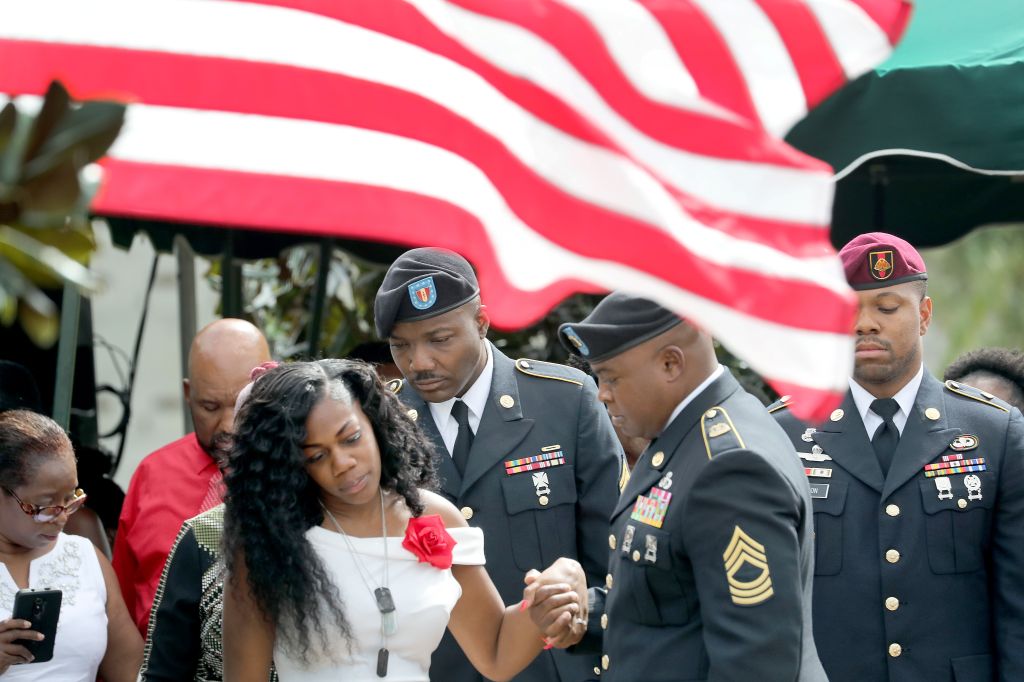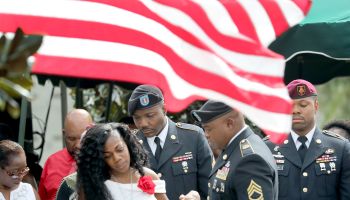
Source: Sun Sentinel / Getty
The year is 1990. The Gulf War just started. I don’t understand much of it, but I am able to gather from the news that Sadaam Hussein is bad, from my parents that (the first) President George Bush is also bad, and from both sources that a lot of young men will die. Winnie Cooper’s brother died in Vietnam on The Wonder Years. My uncle who served came back with a lot of problems, as did a lot of the other men we see when we visit my mom’s family in Chicago’s Robert Taylor Homes on the weekends.
My first grade teacher is a glamorous woman who reminds me of Patti LaBelle. She owns a boutique that sells glamorous, Patti LaBelle-style fashions. She also sells American flag earrings and pins, which would become prizes for student achievement and symbols of patriotism in the midst of this war thing that is all around us now. I am excited to win one, until I do.
I am six and gap-toothed, with two uncooperative braids on each side of my head, weighed down by a hard brush and an excessive amount of Pink Oil Lotion. A shy kid, I quietly desire a place in the spotlight, but find it most often in the elaborate Barbie doll plays I stage at home.
However, I am now preparing for my first speaking engagement: saying the Pledge of Allegiance over the PA system.
It is a special tradition for first graders at Beasley Academic Center to lead the morning ritual declaring our loyalty to a country that didn’t think highly of Black folks. A country that wouldn’t believe that a school nestled in the projects where my mom’s family lived—public housing named for a Black doctor who once treated neighborhood children—was home to some of the city’s brightest students.
Though I hear my parents commiserate about their discomfort with me saying the Pledge at all, they allow me to enjoy my moment—just as I was able to enjoy winning a coveted American flag brooch at school that I would never wear or touch again after I brought it home.
“Good morning, my name is Jamilah and I am in Room 111. Please stand for the Pledge of Allegiance….” After the Pledge comes the good part, the part that actually energized us going into another day of learning: “The Beasley Creed,” a lovely affirmation of the work we had to do and the potential that we possessed.
“B-Believe in yourself. E-Examine your work when you are finished. A-Apply what you have learned in class. S-Select a quiet place to do your work. L-Learn all that you can to day. E-Evaluate each answer you give. Y-You have a bright future. Have a great day.”
The recitation is less gratifying than I’d hoped it would be. It’s cool to know that my voice was heard by hundreds of other kids, but it was over quickly and my parents’ lack of enthusiasm for the biggest “performance” of my life weigh down the moment. At this point, I already know quite a bit about how African people were brought to this country and what we had endured in the years since. I also know that the Pledge and the flag that we face as we recite it mean a lot to many people—including other Black folks. Maybe even to those men who’d come back from Vietnam as mere shadows of who they once were.
The Beasley Creed feels like me, but those other words do not. Nor do the flag or the national anthem. They are words and symbols that sit in an imaginary drawer, much like that brooch: acquired, but not prized.
The year is 2001. It is my last year at Whitney Young Magnet High School and a devastating terror attack has just taken thousands of civilian lives on United States soil (and will be used to justify military measures that will kill thousands of civilians abroad.)
I am 16 years old, with braces, dark lipstick, and wedge-heeled shoes that result in regular falls and rolled ankles. I’m awkward and outspoken at once, and already approaching the end of my brief career as a spoken word poet that finds me known among my peers for my “radical” racial politics. On the rare occasion that I find myself present for a performance of “The Star Spangled Banner” or the Pledge of Allegiance, I comfortably and confidently remain seated—until now. People notice now. It is a clear political choice now, no longer something that could be easily mistaken for mindless youthful rebellion or laziness.
The Reverend Jesse Jackson is at my school for a blood drive and assembly, where he speaks about coming together as a country in light of this horrible tragedy.
For the first time in my life, patriotism has left me torn. This is the Reverend Jesse Jackson. Whitney Young is a very diverse school, and the crowd in the auditorium somehow underscores that more than it does at our usual gatherings. The local press is here. The old adage, “Don’t embarrass me in front of these white folks” cuts both ways at this moment. I decide to say something, respectfully.
“Reverend Jackson, what do you say to those of us who are very sad about what happened, but who are also struggling with the idea of being patriotic to a country that has done so much damage to our people? Some of us have never felt any allegiance to this flag, but we feel sympathy for the people who died and got hurt. How do we stand with the victims and against those who wish to hurt Americans, while not just excusing everything America has done to us? Also, how should the Black community prepare for a war that rob so many of our men, much like Vietnam did—maybe even women, too, this time?”
It seems clear the reverend wasn’t prepared for that sort of discourse in this venue. He says something about Black people being the original patriots because we built the country and something else about the African Burial Ground near Wall Street, near where the World Trade Center once stood, near the office where I now work. He seems frustrated.
Later, a few of my white teachers give me props for what I said. It is hard not to assume they just don’t like Reverend Jackson in the first place and that I have embarrassed him in front of white folks.
It is 2016. Colin Kaepernick, who I only know by name at this point because he is handsome and a Kappa, is taking the national anthem ritual at NFL games as a moment of political protest. My 10-year college reunion is rapidly approaching and it still feels strange to see Black people embrace the symbols of American patriotism. My beloved Howard University includes both “The Star Spangled Banner,” the words to which I have now long since forgotten, and “Lift Ev’ry Voice and Sing” in official school events—we raise a fist during the latter. Something still feels missing.
I am now the mother of a 3-year-old girl with a cute little Afro and a tiny-but-commanding voice. During a recent airport visit, she excitedly pointed to the “American Dad flag!” and I cannot contain my laughter (nor my embarrassment at having let her watch the adult cartoon). Her dad and I have managed to talk to her about race, gender, sexuality, and healthy self-identity, but haven’t quite figured out how to explain America to her yet.
This is her second year at an African-centered preschool, where the Pledge of Allegiance will never be uttered, where Columbus Day is a regular Monday, and Malcolm X’s birthday is a day off. Students are only taught to salute the Pan-African flag, and the school community takes great pride in doing so at every assembly with a song:
“Praise the red, the black, and the green! The brothers and sisters are being redeemed! Why don’t you open up your eyes and see, we’re on our way to being free/ The red is for the blood we shed, the black is for the race, that’s us/the green is for the land, uh-huh, so the Black man can take his rightful place.”
Minus the gendering of Blackness, this is an anthem that I connect with, something I am proud that my child knows at such a young age.
It is 2017. The president is a white supremacist and people who acknowledge that publicly have been targeted and accused of being the “real” racists. It’s a violent, high-stakes game of “I know you are, but what I am?” More athletes are protesting during the national anthem, only to be met with abuse from the White House, fans, and the white leaders of athletic leagues powered by Black talent. The anthem is weaponized against those who refuse to place country over countryman, those who demand that the American experiences of Black people are, in fact, American enough to matter. Kaepernick is unemployed as a result.
I am 33 and clearer than ever about my issues with America—and by extension, her flag, anthem, and pledge. While a large scale war seems to be but 140 unpresidential characters away, I am also clear that there are soldiers who look like me who are fighting daily for my right not to salute the very flag that will drape many of their coffins.
Consequently, it is during this year that I find myself emotional at the sight of the American flag for the very first time, via the viral image of Myiesha Johnson slumped over one of those star-spangled caskets. A young wife and mother with a second child on the way, she lost her husband under questionable circumstances that point back to the grave ineptitude of the current administration. Then she was disrespected by the very powers that may have led him to his death. The cruelty of the stars and stripes that separate Sargent La’David Johnson from his young family is, perhaps, the best analogy for what this country does to my people, including those who dare to love it.
It is 2018. This article has been stuck in drafts for months, due in part to a rapid and cataclysmic news cycle, a busy holiday season and the depression that steals so much from women who view the world with eyes like mine.
I now know that I share something in common with our Deplorable-in-Chief (aside from our eagerness to self-destruct in real time via Twitter): that motherf*cker doesn’t know the anthem either. O, say, can you see the jig? You better.
When I next find myself present for a performance of the song, I’ll say a prayer for the Johnsons, for all of us who don’t deserve the burden of those stars and bars. From my seat.
















